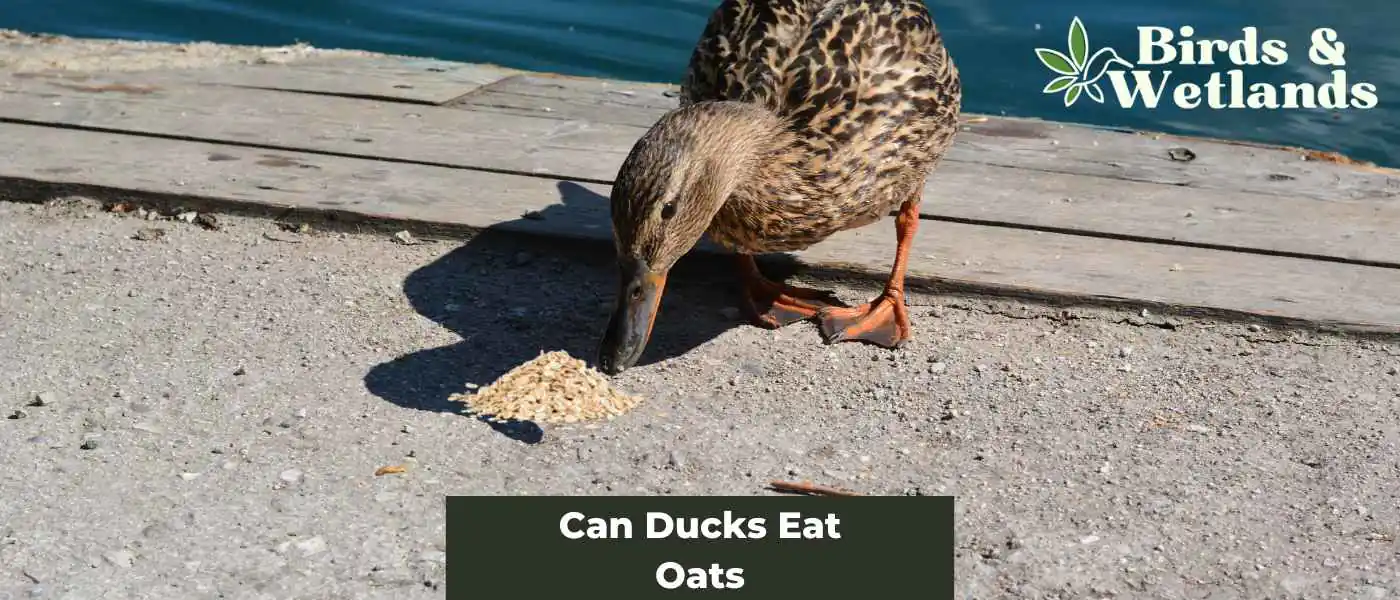Did you know that ducks can have a varied diet beyond just bread and water?
Today we’ll answer the question of whether ducks can safely eat oats.
Yes, ducks can eat oats as they are a safe and nutritious food option. Oats provide ducks with essential nutrients such as carbohydrates, proteins, fibre, vitamins, and minerals, which can contribute to their overall health. When offering oats to ducks, it is best to provide them with rolled or crushed oats, as these are easier for them to digest.
Key Takeaways on Can Ducks Eat Oats
- Eating oats provides geese and ducks with nutritional benefits including fiber, protein, vitamins and minerals.
- Oats are safe for ducks to eat in moderation and can provide nutritional benefits.
- Feeding ducks too much oats or any one food can be harmful to their health and should be avoided.
- It’s important to provide ducks with a varied diet that includes a mix of grains, vegetables, and protein sources.
- Ducks love oats but they should be given as an occasional treat, two to three times a week.
- Don’t feed your baby ducks only oats, because they can’t provide all the nutrients young ducks need for proper growth and development.
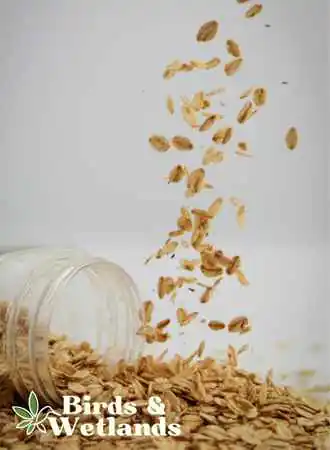
Are oats healthy for ducks?
Many duck owners are hesitant to feed their ducks oats because oats are not a natural part of a duck’s diet and are considered processed foods. However, it’s important to note that oats can be a nutritious and delicious addition to a duck’s diet when fed in moderation.
Not only can oats be a tasty treat for your backyard ducks such as magpie ducks, but they can also be a tasty food for wild ducks at local parks. Instead of feeding bread or processed food, which offers little to no nutritional value, consider offering oats as a healthier alternative.
Ducks feast on plants and invertebrates to get all the vitamins they need. But they will eat oats if given to them.
Here are the multiple health benefits of oats:
Antioxidants
Antioxidants are important nutrients that help to protect cells from damage caused by free radicals. Free radicals are highly reactive molecules that are by-products of metabolism. They can cause damage to cells, proteins, and DNA if left unchecked.
Antioxidants help ducks neutralize free radicals and reduce the risk of oxidative stress, which can lead to various health problems. Additionally, antioxidants can help to support the immune system, improve digestion, and promote overall wellness in ducks.
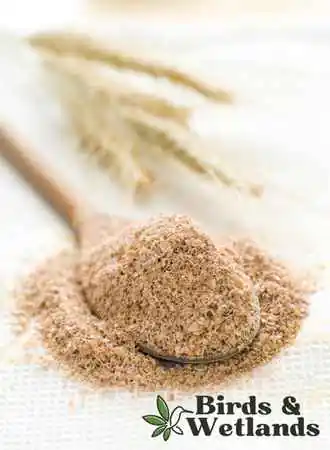
Protein
Oats are a good source of protein. It is an essential nutrient necessary for the growth, repair, and maintenance of tissues in the body. It also plays an important role in the body’s production of enzymes, hormones, and other important molecules. Ducks require a certain amount of protein to support these processes.
Protein is made up of amino acids, and some of these amino acids are considered essential because they cannot be produced by the body and must be obtained through the diet.
Fiber
Oats aids digestion, thanks to their fiber content which is good for adult digestive systems.
Fiber is important for maintaining a healthy digestive system. When a duck consumes fiber, it passes through the digestive system largely unchanged, adding bulk to the stool and helping to keep the digestive tract clean and functioning properly.
Oats are a good source of both soluble and insoluble fiber.
Soluble fiber is a type of fiber that dissolves in water and forms a gel-like substance in the duck’s stomach. It can help to lower cholesterol levels and regulate blood sugar levels.
Oats also contain soluble fiber, particularly beta-glucan, which has been shown to have cholesterol-lowering properties.
Insoluble fiber is a type of fiber that does not dissolve in water and helps to add bulk to the stool, promoting regular bowel movements.
Phosphorus & Magnesium
Phosphorus and magnesium are essential minerals necessary for the ducks’ body to function properly. They play important roles in various physiological processes, including the metabolism of nutrients, the production of energy, and the maintenance of healthy bones.
Phosphorus is necessary for the formation of bones. It also plays a role in producing ATP, the main energy source for the body’s cells.
Magnesium is involved in many enzymatic reactions in the body and is necessary for proper functioning muscles, the immune system, and the nervous system.
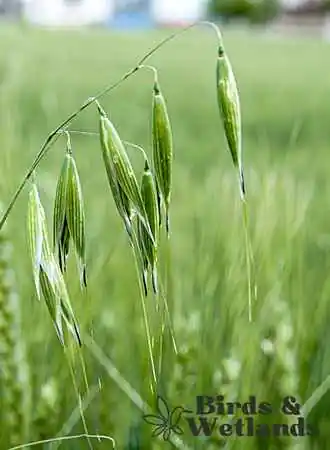
Iron & Zinc
Iron and zinc are essential minerals that play important roles in the body.
Iron is necessary to produce red blood cells, which carry oxygen to the body’s tissues. It is also essential for the proper functioning of the immune system.
Zinc is involved in many enzymatic reactions in the body and is necessary for the proper growth and development of cells, tissues, and organs. It is also important for the immune system and for the sense of taste and smell.
What kind of oats can ducks eat?
Steel-cut Oats
Steel-cut oats are whole-grain oats made by cutting the whole-oat grain into small pieces with a steel blade. They are sometimes called Irish oats or pinhead oats.
Steel-cut oats have a chewy texture and a nutty, slightly sweet flavor. They are considered more nutritious than other types of processed oats because they are minimally processed and retain the grain’s nutrient-rich bran and germ layers.
Steel-cut oats are a good source of fiber, protein, vitamins, minerals, and antioxidants. They can be used as ingredients in various recipes, including oatmeal, granola, and baked goods.
Quick Oats
Quick oats, also known as instant oats or quick-cooking oats, have been partially cooked and then rolled and pressed thin. They are usually sold in a flaked or milled form and cook more quickly than other oats because they have been pre-cooked and partially broken down.
Quick oats are a convenient option for making oatmeal and other oat-based recipes. They are generally less nutritious than other oats because they are more processed and have had the nutrient-rich bran and germ layers removed.
Despite this, quick oats are still a good source of fiber, protein, vitamins, and minerals and can be a nutritious choice when consumed in moderation as part of a balanced diet.
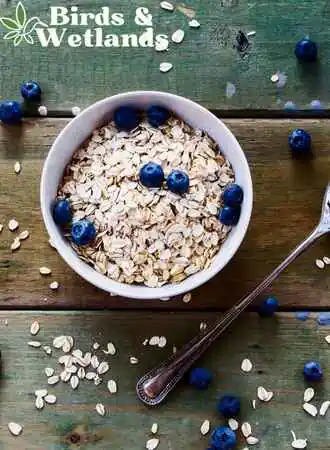
Rolled Oats
Rolled oats, also known as old-fashioned oats, have been steamed and then rolled flat. They are usually sold in a flaked form and are intermediate in size between quick oats and steel-cut oats.
Rolled oats have a slightly chewy texture and a nutty, sweet flavor, and they are a good source of fiber, protein, vitamins such as vitamin E, minerals, and antioxidants.
Rolled oats differ from quick oats in that they are less processed and retain more of the grain’s nutrient-rich bran and germ layers. They also have a slightly thicker texture and distinct flavor than quick oats.
Can ducks eat uncooked oatmeal?
Ducks can eat uncooked oats, a good source of nutrients. However, there are a few things to consider when feeding ducks oats.
Uncooked oats may appeal to ducks more than cooked oats. Cooked oats are easier to digest, and the cooking process helps make the nutrients more accessible to the duck’s body.
However, uncooked oats have a longer shelf life, so they can be a good option if you need to store them for a while.
Knowing the potential risks associated with feeding ducks uncooked oats is also important. One of the primary concerns regarding feeding ducks raw oats is their anti-nutrients, like phytic acid, which can interfere with the absorption of minerals in the duck’s diet.
Additionally, if the duck swallows too many large grains of oats, it could obstruct its digestive tract and lead to serious health problems.
In general, it’s best to cook oats before feeding them to ducks to help make them more digestible and reduce the risk of potential health issues.
However, if you do choose to feed ducks uncooked oats, it’s important to be aware of these potential risks and monitor the ducks closely to ensure they can digest the oats properly.
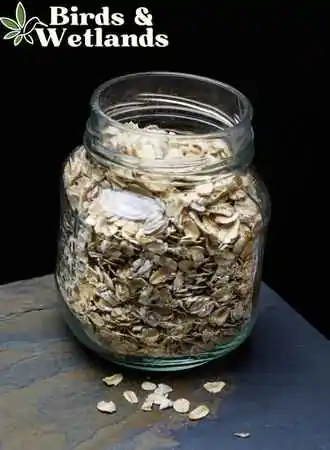
Can ducks eat porridge oats?
Porridge oats can be a great way of providing ducks with a healthy and nutritious meal. They contain numerous beneficial nutrients, such as proteins, vitamins, minerals and dietary fiber, which are all essential for the physical health of ducks.
However, it is important to remember that porridge oats should not be mixed with either sugars or milk before being offered to ducks. Adding these ingredients would lead to an unhealthy diet for the birds and could cause adverse health problems in the long run.
Can ducks eat rolled oats?
Yes, ducks can definitely eat rolled oats, which are the easiest to digest among all oat types.
Can ducklings eat oats?
Oats can be an occasional treat for ducklings, but they should not make up the bulk of a duckling’s diet.
Duck feed pellets are high in protein, essential vitamins, minerals, and other nutrients that ducklings need to keep them strong and healthy. Mixed with fresh vegetables and fruits, this type of feed provides a balanced nutrition that is best for growing ducks.
Oats should only make up a small portion of a duckling’s diet, as they are less nutritionally dense. Oats’ primary benefit is their fiber content; however, too much fiber can cause diarrhea in young birds, so it is important to ensure oats are only provided in moderation.
Additionally, rolled or steel-cut oats are preferable to instant oatmeal because they have more nutritional value due to their lower processing time.
Can Muscovy ducks eat oats?
Muscovy ducks are duck species native to Central and South America. They are known for their distinctive red and black facial skin and are considered a more flavorful alternative to other common duck breeds.
Muscovy ducks can eat oats as part of a well-rounded diet. Oats are a good source of fiber and provide several essential nutrients, including B vitamins and minerals like iron and zinc.
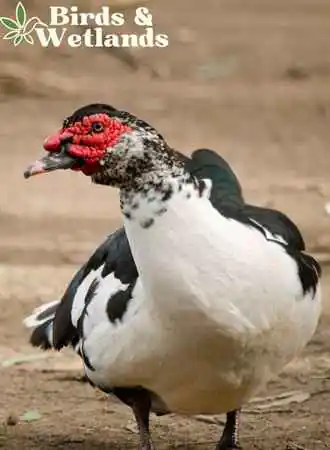
How much oats can ducks eat?
Oats can be part of a duck’s natural diet. But they should be given as an occasional treat, two to three times a week.
How to feed oats to ducks
Ducks enjoy eating oats. Here’s how you can serve oats to ducks:
- Mix oats with your duck’s feed or other foods such as vegetable scraps and leafy greens.
- You can also try adding oats to a fruit salad consisting of berries, stone fruit and bananas to create a healthy treat.
- Add water to dry oats to make them easier to digest.
- Ducks eat grains, so you can mix oats with corn and millet.
- Remove leftover food or leftover oats lying around to avoid attracting rodents and other wildlife.
- Avoid feeding ducks whole oat groats because it could lead to digestive issues.
Similar Foods for Ducks
| Bread | Is Bread Safe for Ducks? |
| Rice | Can Ducks Enjoy Rice? |
| Oats | Feeding Ducks Oats |
| Sunflower Seeds | Sunflower Seeds: A Duck Treat |
| Bird Seed | Can Ducks Eat Bird Seed? |
| Corn | Can Ducks Eat Corn? |
Best Duck Feed Pellets
Are you a duck owner looking for the perfect feed to keep your feathered friends happy and healthy? Look no further than Purina Duck Feed Pellets! With their nutritionally balanced formula and high-quality ingredients, these pellets are the ultimate solution for providing your ducks with the nutrition they need to thrive.
Pros
- Complete Nutrition: Purina Duck Feed Pellets are nutritionally balanced to provide all the essential vitamins and minerals that ducks need to stay healthy and strong.
- Easy to Digest: The pellets are specially formulated to be easy to digest, which makes them ideal for ducks of all ages.
- Promotes Growth and Development: With its balanced nutrition formula, Purina Duck Feed Pellets are designed to support healthy growth and development in ducks.
- Suitable for All Breeds: Whether you have domestic ducks or wild ducks, Purina Duck Feed Pellets are suitable for all breeds of ducks.
- Trusted Quality: Purina has been producing high-quality animal feed for over 100 years, so you can trust that your ducks are getting the best possible nutrition with Purina Duck Feed Pellets.
Cons
- Cost: Compared to other types of duck feed on the market, Purina Duck Feed Pellets can be slightly more expensive. However, many customers feel that the high-quality ingredients and balanced nutrition formula are worth the extra investment.
- Pellet Size: Some customers have noted that the pellet size of Purina Duck Feed Pellets can be quite large, which may not be suitable for smaller or younger ducks. However, many customers have reported that the pellets can easily be broken up or soaked in water to make them easier to eat.

